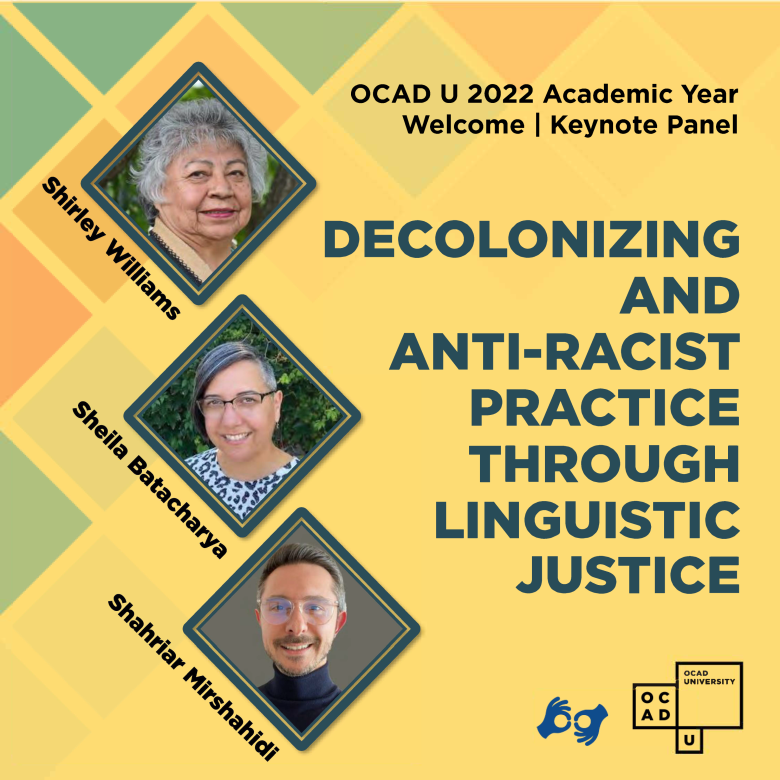
Faculty and staff will kick off the new academic year with a focus on linguistic justice
This year, OCAD U faculty and staff will kick off the fall term with a virtual Academic Year Welcome (AYW) event that will take place on August 31 and September 1.
This annual celebration gives community members time to reflect on their shared commitments and priorities and embraces the major objectives in OCAD U’s new Academic and Strategic Plan.
The keynote presentation is always a highlight of the AYW and is open to the entire OCAD U community including students, faculty and staff. ASL interpretation will be provided by Canadian Hearing Services.
Titled, Decolonizing and Anti-Racist Practice through Linguistic Justice, the keynote presentation on August 31 will discuss ways to respectfully integrate Indigenous languages and cultures into academic spaces. Anti-racist and decolonizing pedagogies that centre multilingual students, faculty and staff; speakers of non-privileged varieties of English; and multilingual students who are English Language Learners (ELLs) will also be addressed.
The panelists, Elder Shirley Williams (Trent University), Dr. Sheila Batacharya (University of Toronto Mississauga) and Dr. Shahriar Mirshahidi (OCAD University) will share their lived experiences, explore strategies for incorporating linguistic justice into the process of decolonizing education and invite the university community to take these ideas up in their pedagogy for the new academic year.
On September 1, Anishinaabemowin language teacher and Elder Liz Osawamick will lead an online language learning workshop for faculty and staff titled, Linguistic Justice through Language Learning.
Schedule: Wednesday, August 31
|
10 to 10:50 a.m. |
Land Acknowledgement and Welcome Overview of the Event |
|
10:50 to 11 a.m. |
Wellness Break |
|
11 a.m. to 12:30 p.m. |
Keynote Panel |
More about this year’s panelists
Elder Shirley Williams is a highly celebrated and cherished Elder who is deeply passionate about Indigenous knowledge and language revitalization. She is a member of the Bird Clan and is of the Ojibway and Odawa First Nations of Canada. Her Anishinaabe name is Migizi ow Kwe, meaning Eagle Woman. She was born and raised at Wikwemikong, Manitoulin Island and attended St. Joseph’s Residential School in Spanish, Ontario as a child. She received her Bachelor of Arts in Native Studies at Trent University and her Native Language Instructors Program diploma from Lakehead University in Thunder Bay. In addition, Shirley received her Master’s Degree from York University in Environmental Studies. In June of 2004, Shirley retired from the Indigenous Studies Department at Trent University and now holds the title, Professor Emeritus.
Dr. Sheila Batacharya has been teaching university and college courses since 2007. This experience inspired her to specialize in English language learning and teaching. Dr. Batacharya is an Assistant Professor, Teaching Stream at the Institute for the Study of University Pedagogy (ISUP), University of Toronto Mississauga. Dr. Batacharya’s academic work in Women and Gender Studies, Sociology and Equity Studies, and Adult Education continues to provide her with an interdisciplinary foundation for her teaching and research. Her publications include two co-edited volumes: Reena Virk: Critical Perspectives on a Canadian Murder (2010) and Sharing Breath: Embodied Learning and Decolonization (2018). Recently, Dr. Batacharya co-chaired ISUP Colloquium 2022: Race, Linguistic Justice, and Critical Approaches to Communicative Competence.
Dr. Shahriar Mirshahidi is an applied linguist and language educator. His research and pedagogy focus on translingual approaches to meaning-making and transcultural dispositions. He strives for decolonizing language education by pushing against regimes of normativity, which have dominated our conceptualization of effective communication, particularly in academia. At OCAD University, Dr. Mirshahidi works with the English for Art & Design (EAD) Program where he and his colleagues support multilingual students in gaining their voice and agency to engage critically with their creative practice. Prior to joining OCAD U, he served as a Postdoctoral Research Scholar at Pennsylvania State University where he researched English for Specific Purposes and Intercultural Communication. He holds a doctoral degree from Oklahoma State University in Applied Linguistics with a focus on international teaching assistants' education and assessment.
Schedule: Thursday, September 1
|
10 a.m. to 12 p.m. |
Workshop |
More about this year's workshop
Part of decolonizing means intentionally and respectfully integrating the Indigenous languages and cultures of Turtle Island in shared creative and academic spaces. Simultaneously, we must be aware that English monolingualism is still assumed as the norm in these spaces, reflecting colonial structures of teaching and learning in universities. English Language Learners and Indigenous, Black and racialized mono-and-multilingual faculty, staff and students are often told, implicitly or explicitly that their languages and cultures have no place in the classroom or in their academic and creative practices. This workshop will address these conditions.